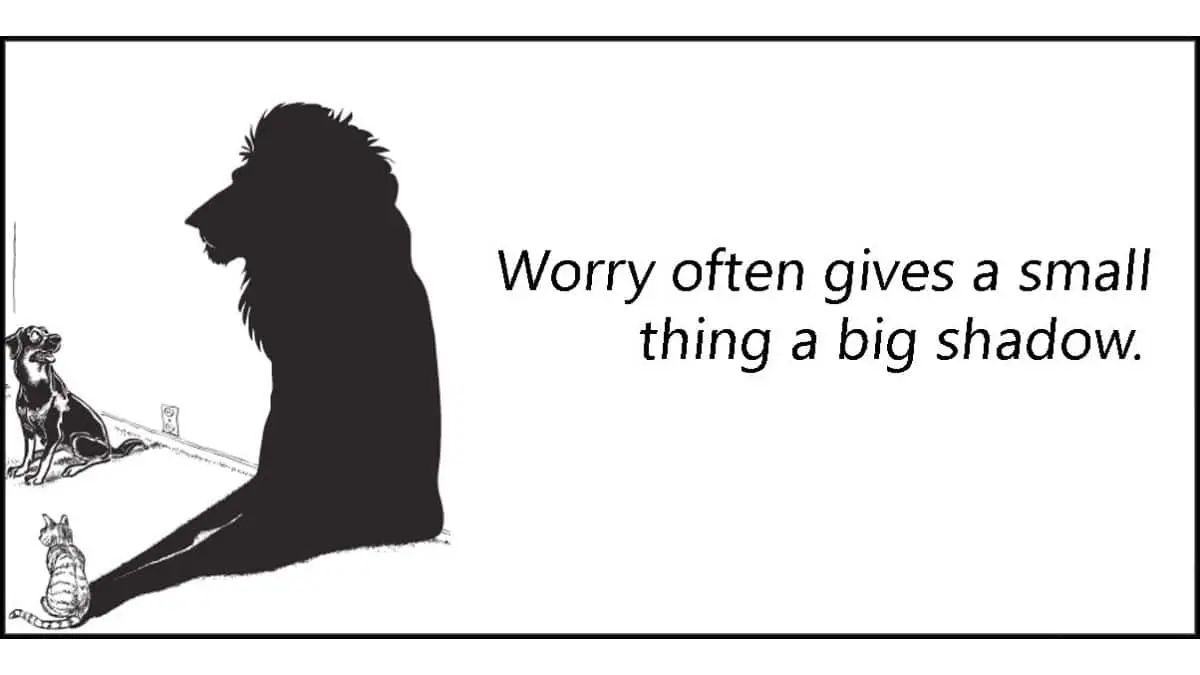In the labyrinth of human emotions, worry often stands as a towering presence, casting long shadows over our peace of mind and happiness. The old saying, “Worry gives a small thing a big shadow,” encapsulates this phenomenon. It reminds us how the act of worrying can magnify a problem in our minds, making it appear much larger and more daunting than it truly is. But the question that naturally follows is: How do we step out of this shadow? How can we prevent minor concerns from ballooning into overwhelming anxieties?
Understanding the Shadow
First, it’s crucial to recognize that worry, in its essence, is an emotional response to uncertainty about the future. It’s a natural, albeit often unhelpful, part of being human. Worrying about a small problem doesn’t prevent it from happening; it only detracts from our current happiness and may even escalate the issue in our minds.

Stepping into the Light: Strategies to Overcome Excessive Worry
1. Mindfulness and Acceptance
One of the most effective ways to manage worry is through mindfulness. This involves living in the present moment and accepting your feelings without judgment. By acknowledging your worries without allowing them to control your thoughts and actions, you can reduce their impact. Mindfulness practices, such as meditation and deep-breathing exercises, can help you stay grounded in the present moment, reducing the tendency to overthink or catastrophize.
2. Perspective Shifting
Try to adopt a more balanced perspective on the issue at hand. Ask yourself: “In the grand scheme of things, how significant is this problem?” Often, you’ll find that your worry is disproportionate to the actual situation. Remind yourself of past challenges you’ve overcome. This reflection can provide a more accurate sense of perspective and diminish the shadow cast by current worries.
3. Structured Problem-Solving
Rather than ruminating on what might go wrong, focus on actionable solutions. Break down the problem into manageable steps and tackle them one by one. This approach shifts your focus from worrying to problem-solving, empowering you to take control of the situation.
4. Limiting Worry Time
Allocate a specific time of day for worrying – say, 15 minutes in the afternoon. During this period, allow yourself to fully embrace your worries. Once the time is up, consciously redirect your thoughts to more positive or productive activities. This technique can help contain your worries to a specific part of your day, preventing them from overshadowing your entire day.
5. Seeking Support
Sometimes, sharing your worries with a trusted friend, family member, or professional can provide a new perspective and alleviate the burden of carrying them alone. Externalizing your concerns can also help you realize that they may not be as monumental as they appear in your mind.
6. Cultivating Gratitude
Focusing on the aspects of your life for which you are grateful can significantly counterbalance worries. Keeping a gratitude journal or simply reflecting on positive experiences and relationships can shift your focus away from negative thoughts and reduce the intensity of your worries.
Embracing the Light Beyond the Shadow
The adage “Worry gives a small thing a big shadow” serves as a poignant reminder of the power of our thoughts. By understanding the nature of worry and employing strategies to manage it effectively, we can prevent minor concerns from casting long shadows over our lives. Instead, we can learn to embrace the light of positivity, resilience, and growth, transforming our approach to challenges and enhancing our overall well-being.
Also Read: Learning is the only thing the mind never exhausts, never fears, and never regrets




